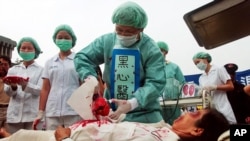Organ donation has become big business in China. There is a high demand for organ transplants but a low organ donation rate. So, for years, China depended on organs from prisoners who had been executed.
That has changed.
China announced recently that it will stop using the organs of executed prisoners. The China Daily newspaper says the government now will accept only voluntary organ donations. The report said the policy began January 1.
China’s former health vice-minister Huang Jiefu made the announcement at a meeting in December. He was speaking to the country’s Organ Procurement Organization, which the government formed last year.
Mr. Huang leads another newly formed government group, the Committee of Human Organ Donation. The China Daily report said Mr. Huang’s group will create policies and rules on organ donation and use. The newspaper said the Organ Procurement Organization, or OPO, will work to make sure the process is honest, open, fair and not wasteful.
China’s low donation rate
China has one of the world's lowest rates of organ donation. Mr. Huang says distrust of the donation system is the main cause.
He says that Chinese people are much less likely to donate their organs after death compared to people in other countries. He told China Daily that the ratio is about 6 out of 10,000,000 people.
US organ group working with China
Gabriel Danovitch is a doctor at University of California, Los Angeles. He is also a member of an organization called The Transplantation Society. He says the organization is working with the Chinese government to establish an organ transplant registry similar to those in the United States and Europe. He says the practice of depending on executed prisoners must end.
“I believe that at the highest levels of the Chinese government and health ministries a decision has been made, and there is an understanding that this practice must come to an end.“
A top Chinese health official, Haibo Wang, made a similar statement in 2012. He told the World Health Organization Bulletin that depending on the organs of prisoners sentenced to death is not ethical or sustainable for China.
Gabriel Danovitch says China also needs to change the organ donation system. He says it currently serves mainly wealthy people.
“China has almost been like a department store for organs for people coming from all over the world to pay for those organs and pay big money for those organs.”
Falun Gong has interest in this issue
In December, VOA reported on a demonstration in Los Angeles, California, about the issue. Protesters demanded that China stop using the organs of executed prisoners. The protesters were followers of the Chinese spiritual movement Falun Gong. They gathered at the Chinese diplomatic offices in Los Angeles. The demonstrators accused the Chinese government of forcing Falun Gong prisoners to donate their organs.
At the protest a woman named Zeng Zheng spoke about her detention experience in China to reporters.
“I remember that day very clearly. We were transferred from the detention center to the labor camp. The person we saw, to our surprise, was not the police guard but a doctor. We were taken to an unknown place where a doctor was waiting for us and to interrogate us about our medical history.”
Falun Gong follower Dana Churchill is with the group Doctors Against Forced Organ Harvesting.
“The majority of the people in the labor camps are Falun Gong. The majority of the organs are all coming from Falun Gong practitioners. Sixty-five thousand Falun Gong practitioners are estimated to have been murdered for their organs from 2001 ‘till (until) about 2006, 2007."
A Chinese government official told the China Daily that these claims are completely false. Harry Wu spent 19 years in Chinese labor camps. He has since become a U.S. citizen and a leading human rights activist. He says the group must show evidence of Chinese government wrongdoing.
“If you want to protest, if you want to argue, if you want to show up in front of the Chinese government, Chinese official, whatever ... it’s right. But I told Falun Gong very clear((ly)) you really need the evidence.”
In China, prisoners will still be able to donate their organs. However, now their body parts will be registered in the computerized system instead of being used for private trades. Huang Jiefu told reporters that this is the main difference under China’s new organ donation system.
I’m Kelly Jean Kelly.
And I’m Anna Matteo.
Are you an organ donor? Why or why not? How do you feel about prisoners donating their organs after being executed? Besides a computerized registry system, how can governments make the process more ethical? Share your thoughts in the comments section.
Anna Matteo wrote this article for Learning English based on reports from CNN, China Daily, and Elizabeth Lee reporting from Los Angeles, California for VOANews.
____________________________________________________________
Words in this Story
transplant – n. medical an operation in which an organ or other part is removed from the body of one person and put into the body of another person
voluntary – adj. done or given because you want to and not because you are forced to : done or given by choice
ratio - n. the relationship that exists between the size, number, or amount of two things and that is often represented by two numbers
ethical – adj. following accepted rules of behavior : morally right and good
sustainable – adj. able to last or continue for a long time








